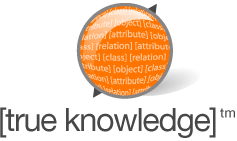8 results for dbpedia vs freebase
 True Knowledge is a natural language search engine and question answering site, but to leave it at that would not do the site justice. What makes it stand out from similar sounding services like Powerset and Freebase? True Knowledge tackles natural language search and question answering (much like Powerset and Hakia), and it also maintains a knowledge base of facts about the world (similar to DBpedia and Freebase). However, what makes True Knowledge stand out is that they've combined these features and encourage their userbase to contribute facts and add new knowledge.
True Knowledge is a natural language search engine and question answering site, but to leave it at that would not do the site justice. What makes it stand out from similar sounding services like Powerset and Freebase? True Knowledge tackles natural language search and question answering (much like Powerset and Hakia), and it also maintains a knowledge base of facts about the world (similar to DBpedia and Freebase). However, what makes True Knowledge stand out is that they've combined these features and encourage their userbase to contribute facts and add new knowledge.
Continue reading True Knowledge: The Natural Language Question Answering Wikipedia for Facts
 At ISWC2008 Freebase released its new RDF service for generating RDF representations of Freebase topics, allowing Freebase to be used as Linked Data! To obtain the RDF data for a topic send a GET request to http://rdf.freebase.com/rdf/some.topic.id where "some.topic.id" is replaced by the desired topic identifier (slashes in the identifier must be replaced by dots). Topic data can be represented as N3, RDF/XML or Turtle depending on the preferences expressed in your client's HTTP Accept header. Try it out with the Freebase topic Semantic Web.
At ISWC2008 Freebase released its new RDF service for generating RDF representations of Freebase topics, allowing Freebase to be used as Linked Data! To obtain the RDF data for a topic send a GET request to http://rdf.freebase.com/rdf/some.topic.id where "some.topic.id" is replaced by the desired topic identifier (slashes in the identifier must be replaced by dots). Topic data can be represented as N3, RDF/XML or Turtle depending on the preferences expressed in your client's HTTP Accept header. Try it out with the Freebase topic Semantic Web.
Continue reading Freebase Officially Linked Data with Release of RDF Service
 Now that Freebase is available as Linked Data a big question that comes to mind is whether these two major projects will move to assimilate one another. DBpedia and Freebase – two endeavors primarily focused on curating unstructured and semi-structured data about everything and releasing it back into the wild (with structure) – get the bulk of their information from Wikipedia, so the amount of topical overlap is assumed to be extremely high. DBpedia gains new information when it extracts data from the latest Wikipedia dump, whereas Freebase, in addition to Wikipedia extractions, gains new information through its userbase of editors.
Now that Freebase is available as Linked Data a big question that comes to mind is whether these two major projects will move to assimilate one another. DBpedia and Freebase – two endeavors primarily focused on curating unstructured and semi-structured data about everything and releasing it back into the wild (with structure) – get the bulk of their information from Wikipedia, so the amount of topical overlap is assumed to be extremely high. DBpedia gains new information when it extracts data from the latest Wikipedia dump, whereas Freebase, in addition to Wikipedia extractions, gains new information through its userbase of editors.
Continue reading Cross-Pollinating DBpedia and Freebase
 Over the years I've noticed that the importance of algorithms and data tends to shift back and forth, depending on which at the time is hardest to duplicate (often from a business perspective). This effect seems to be caused by the availability or demand of one side increasing or decreasing, shifting the balance of importance to the other. At one point the world of software was dominated by the proprietary. The organization with the best software (backend, algorithms, etc) was the dominant entity and data (from say, a Web 2.0 perspective) was generally not the focus. This may have partly been the responsibility of a mindset formed during an era with very little storage space and before mass user activity on the Web.
Over the years I've noticed that the importance of algorithms and data tends to shift back and forth, depending on which at the time is hardest to duplicate (often from a business perspective). This effect seems to be caused by the availability or demand of one side increasing or decreasing, shifting the balance of importance to the other. At one point the world of software was dominated by the proprietary. The organization with the best software (backend, algorithms, etc) was the dominant entity and data (from say, a Web 2.0 perspective) was generally not the focus. This may have partly been the responsibility of a mindset formed during an era with very little storage space and before mass user activity on the Web.
Continue reading Algorithms vs. Data: The Seesaw Effect
DBpedia concepts with corresponding photo collections from Christian Becker's Flickr Wrappr are now accessable by following the dbpedia:hasPictureCollection property. This means an additional 30-50 million photos are accessible through DBpedia.
For each of the 1.95 million DBpedia concepts, Flickr Wrappr generates a collection of Flickr photos that depict the concept. The DBpedia project never ceases to amaze me! Check out their entry for examples and more information.
Update: Paul Miller from Talis updated me with some new information.
 I just recently stumbled upon Talking with Talis, a blog by Talis that hosts podcasts they've created from interviews with various people in the Semantic Web community. In their archives you can find nearly 60 podcasts, and this number is growing. The podcasts are fairly lengthy too, with most ranging between a half-hour to an hour long. For convenience and reference, each podcast entry lists the sites they talk about during the conversation, which makes following along easier.
I just recently stumbled upon Talking with Talis, a blog by Talis that hosts podcasts they've created from interviews with various people in the Semantic Web community. In their archives you can find nearly 60 podcasts, and this number is growing. The podcasts are fairly lengthy too, with most ranging between a half-hour to an hour long. For convenience and reference, each podcast entry lists the sites they talk about during the conversation, which makes following along easier.
Continue reading Semantic Web Podcasts at Talking with Talis
A lot of you emailed me asking where to find more videos, so I'm delivering the goods. I've expanded the previous list from a paltry 17 to a remarkable 302, and I've included podcasts this time! There were so many videos I had to break them up into different categories for easier skimming. There are no duplicates, however I did place some videos into more than one category when I felt it was appropriate. This list is monstrous, enjoy.
Continue reading 302 Semantic Web Videos and Podcasts!
 Freebase stores millions of entities and assertions about nearly every topic one can ponder (thanks are owed to their seed dataset – Wikipedia – and their amazing community). The amount of information that Freebase stores is incredible, and is a testament to what can be accomplished with the help of a dedicated community and a little (or a lot) of clever software engineering.
Freebase stores millions of entities and assertions about nearly every topic one can ponder (thanks are owed to their seed dataset – Wikipedia – and their amazing community). The amount of information that Freebase stores is incredible, and is a testament to what can be accomplished with the help of a dedicated community and a little (or a lot) of clever software engineering.
Continue reading Can Graphd Scale to Meet Semantic Web Demands?
Recent searches
semantic, semantic web search, microsoft semantic web, semantic web blog, semantic focus, semantic web search engine, semantic web problems, semantic cms, semantic web search engines, semantic web, semantic web blogs, camp semantic, semantic web layer cake, natural language processing blog, semantic web microsoft, sparql php, semantic blog, natural language search, true knowledge, eswc 2009, object oriented web, protege tutorial video, rdf tags, introduction to semantic web, php sparql, microsoft rdf, microformats rdf, semantic web conference 2008, owl semantic web, problems with semantic web, rdf vs microformats, cody burleson, protege tutorial, rdf search engine, microformats vs rdf, rdf microformats, semantic web tutorial, semantic web conference 2009, rdf blog, eswc 2008, graphd, rdf microformat, semantic web rdf, blog semantic web, semantic web conference, european semantic web conference 2009, dbpedia freebase, web service life cycle, semanticfocus, python sparql, problems in semantic web, swoogle, curse of knowledge, semantic web introduction, semantic web issues, statistical search, semantic web layers, semantic web vision, twine blog, semantic web podcasts, owl videos, rdf tagging, semantic web natural language processing, arc rdf, falcons search engine, protege 4 tutorial, web videos, european semantic web conference 2008, semantic search engine, semantic web community, semantic web tutorials, semantic natural language processing, semantic web problem, semantic web videos, microformat rdf, natural language processing semantic web, web search engines, open calais, problems with the semantic web, rdf tag, semantic web cake, web thread, tower of babel, bin laden, rdf microsoft, semantic web technology stack, natural language processing blogs, natural language question answering, rdf owl, protege screencast, semantic web logo, problems of semantic web, information extraction blog, microformat vs rdf, protege video tutorial, domain knowledge, james simmons, seesaw effect, semantic search, semantic web references, the curse of knowledge, web 3.0 ideas, web semantic, blog semantic, cms tags, question answering, semantic web games, semantic web technology, aditya thatte, rdf video, spanish semantics, web evolution, data storage in oracle, different from, freebase rdf, microsoft and semantic web, problems semantic web, rdf vs microformat, web search engine, what is true knowledge, freebase dbpedia, jamie lewis blog, question answering wikipedia, semantics, web service ontology, zitgist, freebase linked data, introduction to semantic web vision and technologies, ontology blog, owl introduction, protege semantic, selfishness, semantic update, semantic web protege, focus semantics, freebase vs dbpedia, microformats and rdf, microformats vs, microformats vs semantic web, owl tags, protege semantic web, search engine semantic web, semantic web owl, altova tutorial, backlinks blog, calais initiative, eswc 2008 semantic, protege, semantic web microformats, semantic web research topics, semantic web technologies, arc semantic, natural language semantic web, oracle semantic web, owl semantic, problem with semantic web, rdf, semantic web layer, semantic web tags, service ontology, sparql python, vertical search engines, web blogs, blog rdf, cms semantic, dbpedia vs freebase, hyperdata, natural language processing semantics, ping the semantic web, python semantic web, rdf and microformats, semantic search engines, semantic search example, semantic web services, web object oriented, wikipedia question, wordpress semantic web, information extraction, international semantic web conference 2009, list of vertical search engines, microformats, microformats versus rdf, natural language processing, natural language processing wikipedia, object oriented web page, semantic conference 2008, semantic conference 2009, semantic web conferences 2008, semantic web conferences 2009, semantic web feed, semantic web video, social semantic web, w3c logo, web introductions, webblogs, evolution of semantic web, iri semantic web, issues in semantic web, language question, natural language question answering system, on whose vision is the semantic web concept based, oracle data storage, protege 4.0 tutorial, protege ontology, rdf versus microformats, search engines, search semantic web, semantic data storage, semantic web reference, service, web 3.0 opportunities, web services life cycle, aperture semantic, backlink blog, blog semantics, falcons semantic, hl, introduction of semantic web, leave a comment, legs blog, list of blogs, microsoft semantic web, natural language processing semantic, problem of semantic web, problem semantic web, protege tutorials, rdf blogs, rdf review, semantic web 101, semantic web conferences, semantic web natural language, semantic web podcast, semantic web searches, semantics is, service life cycle, service ontologies, vertical search engines list, web conference 2008, wikipedia natural language processing, arc semantic web, blog natural language processing, european semantic web 2008, foaf search, international semantic web conference, international semantic web conference 2008, introduction to semantic, iswc 2008, life cycle of web services, metadata extraction and tagging service, microformats tags, microsoft sparql, object oriented web pages, owl vs rdf, semantic news aggregator, semantic web 2009, semantic web algorithm, semantic web evolution, semantic web game, semantic web layer cake 2008, semantic web service, semantic web sites, service modeling, spanish semantic, sparql in php, tassilo pellegrini, the nature of selfishness, the semantic web is not a separate web but an extension, tutorial protege, camps semantics, eswc 2008 conference, eswc 2008 semantic web, falcons semantic web search engine, freebase, lowell vizenor, metadata extraction, natural language question, nature of selfishness, object oriented web site, oracle semantic store, owl rdf, pagead2.googlesyndication.com, problems of the semantic web, protege 4, rdf vs. microformats, search engines semantic web, semantic logo, semantic markup tags, semantic web searching, semantic web tools, spanish language semantics, starting a revolution, swoogle.com, tag rdf, the semantic web vision, web service lifecycle, wikipedia question answering, arc php, arc rdf php, blogs semantic web, dbpedia, focus, folktologies, microformats vs. rdf, mining tags, ontology, open calais python, podcast semantic web, problem in semantic web, protege introduction, rdf semantic web, search engine for semantic web, selfishness of mankind, semantic problems, semantic updates, semantic web algorithms, semantic web and search engines, semantic web feeds, semantic web part 4, semantic web vs web 2.0, service lifecycle, stochastic search, storage in oracle, using protege, weaving thread, web 3.0 blog, web technology topics, webservice lifecycle, zeitguiest, blog information extraction, blogs on semantic web, camp semantic, conference semantic web 2008, cross pollination wikipedia, eswc conference 2008, eswc tenerife, ftp p2p, information extraction open source, introduction semantic web
 True Knowledge is a natural language search engine and question answering site, but to leave it at that would not do the site justice. What makes it stand out from similar sounding services like Powerset and Freebase? True Knowledge tackles natural language search and question answering (much like Powerset and Hakia), and it also maintains a knowledge base of facts about the world (similar to DBpedia and Freebase). However, what makes True Knowledge stand out is that they've combined these features and encourage their userbase to contribute facts and add new knowledge.
True Knowledge is a natural language search engine and question answering site, but to leave it at that would not do the site justice. What makes it stand out from similar sounding services like Powerset and Freebase? True Knowledge tackles natural language search and question answering (much like Powerset and Hakia), and it also maintains a knowledge base of facts about the world (similar to DBpedia and Freebase). However, what makes True Knowledge stand out is that they've combined these features and encourage their userbase to contribute facts and add new knowledge.

 Now that Freebase is
Now that Freebase is  Over the years I've noticed that the importance of algorithms and data tends to shift back and forth, depending on which at the time is hardest to duplicate (often from a business perspective). This effect seems to be caused by the availability or demand of one side increasing or decreasing, shifting the balance of importance to the other. At one point the world of software was dominated by the proprietary. The organization with the best software (backend, algorithms, etc) was the dominant entity and data (from say, a Web 2.0 perspective) was generally not the focus. This may have partly been the responsibility of a mindset formed during an era with very little storage space and before mass user activity on the Web.
Over the years I've noticed that the importance of algorithms and data tends to shift back and forth, depending on which at the time is hardest to duplicate (often from a business perspective). This effect seems to be caused by the availability or demand of one side increasing or decreasing, shifting the balance of importance to the other. At one point the world of software was dominated by the proprietary. The organization with the best software (backend, algorithms, etc) was the dominant entity and data (from say, a Web 2.0 perspective) was generally not the focus. This may have partly been the responsibility of a mindset formed during an era with very little storage space and before mass user activity on the Web.
Recently Commented Blog Entries